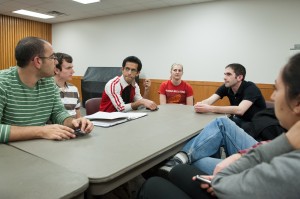According to university communications, 98.5 percent of BYU students are Latter-day Saints, but the 1.5 percent of those belonging to other faiths have a surprising amount of support.
This support comes through clubs that include members of other faiths as well as Latter-day Saints.
One such club is the Newman Club, which provides non-Catholic universities throughout the world a place for students of the Catholic faith to meet.
Ashley Levan, a Catholic and current graduate student at BYU, decided she wanted to organize the BYU Newman Club on campus in 2012.

“I first got the idea to start the Newman club at BYU when a member of my church recommended to me that I help bring the club to campus,” Levan said.
Levan organizes activities and discussion topics for club meetings.
The major topic that the club has discussed recently is the resignation of Pope Benedict and the election of a new pope.
The club meets together for Bible studies every Tuesday and conducts volunteer work at St. Francis Assisi Catholic Church in Orem.
Members of the club also have the opportunity to attend spiritual retreats. These are annual, all-day events where students of the Catholic faith get together to discuss spiritual topics, attend mass and hear a speaker of the Catholic faith.
Levan hopes that students who attend Newman Club meetings or events will have the opportunity to learn more about Catholicism.
“The Newman Club is open to all BYU students who come from different faiths,” Levan said. “We hope that this club will help eliminate religion division and give students a better idea of what Catholics believe.”
Kristi Johns, who is studying molecular biology, helped organize Students Honoring & Appreciating Religious Equity (SHARE) with her husband. They wanted to help minority religions at BYU feel represented.
The mission of the club is to give a voice to minority religions on campus, to unify students that come from different faiths and to help BYU students become more aware of the religious and culture diversity.
“My husband and I were both talking about what we could give back to BYU,” Johns said. “We thought it would be a great opportunity for students from different religious backgrounds to share their beliefs.”
Johns shared that the club arranges activities every week where the group can meet and learn more about beliefs and customs of other religions. She and her husband also arrange public university forums where students of different faiths are asked to share information about their religion.
“SHARE provides a good opportunity to learn about different faiths,” Johns said. “Often times when we learn about different faiths we see how much we have in common with them. This club also helps to build bridges and helps students from different faiths to unite and uplift one another.”
CrossSeekers Christian Fellowship is a club that supports students of the evangelical faith but is open to all faiths.
One of the club’s primary focuses is to give students of the evangelical faith the chance to grow spiritually on and off campus and to unite them with those of the same faith and those from different faiths.
Professor Eula Ewing Monroe, from the BYU Teacher Education Department and club adviser for CrossSeekers, looks at the club as a great opportunity for busy college students to grow spiritually.
“College is the time where students are making important decisions that will impact them for the rest of their lives,” Monroe said. “I feel that this club gives students who attend a kind of home in a spiritual sense and helps them to stay anchored in their faith.”
BYU student Moses Khombe, president of CrossSeekers, hopes that the club will help bring unity to BYU students of other faiths.
“The club provides the chance for students of different faiths to share their beliefs, for us to share ours, read from the scriptures and to pray together and for each other,” Khombe said.
Members of CrossSeekers meet once a week for Bible studies.
“Our club, the CrossSeekers, provides a great opportunity where students who attend can read the Bible and discuss certain passages in the scriptures and what they mean to you,” Khombe said. “We don’t try to influence one’s own interpretation of scripture and ideology.”




